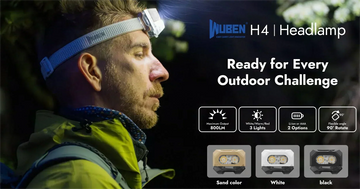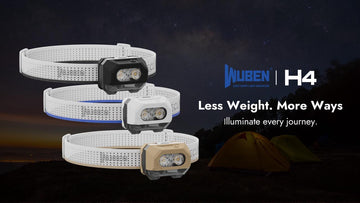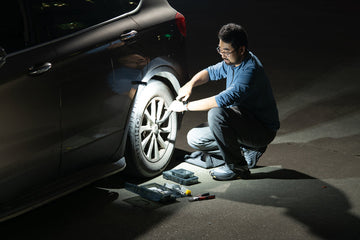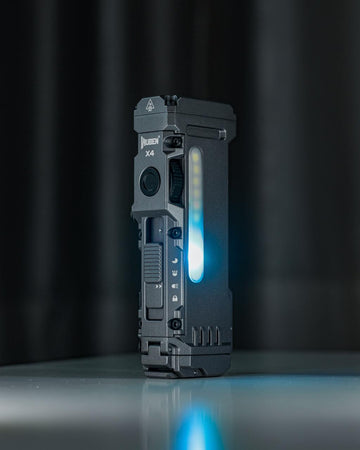What should I do if I encounter danger when camping in the Spring?
Apr 14, 2022
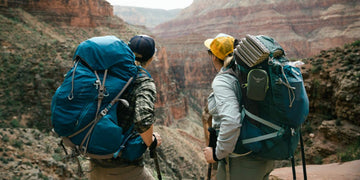
What to do when camping is in danger?

What's not to love about the great outdoors? Undoubtedly a camping trip will be a memorable and pleasant experience where you can commune with nature and enjoy the aromas of campfires and your favourite food. But let's face it, if you're heading into the wilderness there are going to be dangers. By doing research and with the right preparation we can avoid these and to help you, we have summarised common dangers and how to deal with them when in the woods.
Fire hazards
Campfires are magical, but can quickly create danger. The fire needs to be controlled well for the safety of yourself, others and the surrounding forest. Take measures to prevent the fire spreading and keep it a safe distance from your tent. The tent is likely to be made from fire retardant material, but that does not make them or the objects inside them indestructible.
Advice: Where possible, use rocks to build a non-flammable barrier around your fire and keep flammables especially dry paper and liquids away.
Bad Weather Camping

Even if you keep checking the weather forecast, the actual weather will sometimes still surprise you. Be sure to have plans in place for flooding along with extreme heat and coldness. Be prepared for all likely weather scenarios by researching the area and its weather patterns. Hypothermia can still occur in Spring because of cold nights, sudden downpours and building up of sweat from hikes.
Advice: During rainy seasons, camp far away from moving water and low-lying areas in order to distance from dangerous flash floods. Have towels, dry clothes and blankets ready and get dried, changed quickly and warmed up if you get caught in rain, fall in water or sweat too much.
Lightning is another hazard to consider, so during storms, avoid standing near lone trees and aim to escape to a low point in the ground or a group of small trees surrounded by larger ones. If you are in an open field, get low and minimise contact with the ground.
High winds
Winds deserve a whole section because they are surprisingly one of the most dangerous kinds of weather to encounter when camping. High winds can be dangerous to your campsite and can blow tents over if they are not properly staked down. Strong winds can move dead trees that are still standing, which can be blown over onto you, your tent, or your car, harming you or stopping you from leaving. Strong winds can also blow fire pits, causing camp fires to go out of control.
Advice: Avoid pitching your tent up near dead or rotting trees. This will reduce the risk of trees falling on you at night. Ensure you properly stake down your tent and tie it to nearby living trees if it helps. Double-check that you have completely put out your fire before sleeping so no winds can pick up embers or hot ash.
Loss of electricity
A high quality flashlight will definitely come to the rescue and you will be able to instantly light up your space or signal other others where you are and that you need help. Check out our range to become the camping trip saviour! Most or our flashlights have SOS modes and our A1 is also a power bank with a 2km range! Very useful for being found and finding others!
Advice: There is likely to be a time during your adventures where it will make it far easier for you to manage in the dark by freeing up your hands. Such activities include when map reading, fishing, caving or assisting an injured person. To help with this, you may want to consider a headlamp like our powerful 1200 lumens H1 Headlamp, H3 Headlamp or our H5 Flashlight which can be clipped and angled in a variety of ways. Otherwise a power bank flashlight is helpful for both providing light and charging up your phone.
What It Looks Like Today (Wuben H3)
Plants and berries

Unless you are some kind of plant expert, it's probably better to just avoid eating wild berries - many are safe but some can lead to severe illness. This also the case with wild plants where some can badly irritate your skin and be poisonous when eaten.
Advice: Unless you are certain about the type of plant and berry, avoid eating or even touching it.
Insects
These is a real danger because insects such as mosquitoes and ticks are known to carry diseases such as Lyme disease and malaria. They are one of the more difficult dangers to avoid.
Advice: Use insect repellent, especially ones containing Picaridin or DEET and reapply it often. Apply it more if you sweat or go in water. Before sleeping, inspect yourself for ticks and after finding instructions for their safe removal, remove them immediately if you have any. Then consult a physician as soon as you can.
Stay away from visible nests and avoid lotions and perfumes with strong scents and keep skin covered whenever possible.
Heart attacks
In one study, the proportion of deaths during camping due to heart problems was 17%. For some people, especially those who are older and not exercised for a long time, a 2 mile hike can exert them and in some cases cause a heart attack.
Advice: Gather as much medical information as possible about the camping trip attendees and ensure they are fit for any walks. Pair someone else with potentially a vulnerable person and ensure that you are able to call emergency services and know where to seek medical help. People who may struggle on hikes can do gradual exercise leading up to the trip to condition themselves.
Dehydration and heat exhaustion
Dehydration and heat exhaustion aren't the same thing but dehydration can throw off the body’s ability to regulate its temperature. This makes it can be difficult to separate the symptoms of both. Heatstroke can arise from heat exhaustion. This can lead to severe symptoms and even death.
Advice: In hot areas, stay hydrated and camp and hike in areas where it is possible to get shade.
Cliffs
Whether you are camping near cliffs or just hiking on them, cliffs can be dangerous. No matter how stable it seems, a cliff can crumble under you at any time.
Advice: Always stay away from the edges of cliffs because a gust of wind or a clumsy friend could knock you off balance to make you to fall down it. Avoid walking near cliffs alone, so that the other person can help you when necessary.
Bears

There are approximately 40 bear attacks worldwide every year in wooded areas.
Advice: Avoid storing food or scented products in your tent, to reduce of the chances of the bear entering and aim to store food at least 100 feet away from your camp. Hanging food on tree which is 10-15 feet high ensures that the bear cannot reach it. Throw away dishes and paper and clean the grills to also reduce scent that can attract bears. Food waste is best discarded in bear-safe dumpsters, in the ground or in a fire pit.
Travelling in groups makes the bear less likely to approach, but if you encounter one, it is better not to panic or run because this will make them think you are prey and cause them to attack. Move slowly and sideways. If the bear follows, avoid climbing trees because grizzly and black bears can climb them too. Leave the area, or allow the bear to leave by having a clear exit so it does not feel trapped and attacks. If you have a flashlight, don't strobe the bear as it may become irritated and attack or become curious and approach you. Also, avoid giving the bear food because it will encourage it to stay around.
Infected drinking water
Germs such giardia, norovirus, cryptosporidium can stay in fresh water and make you ill when you drink it.
Advice: Pack a water filter, purifying tablets or powders to get rid of bacteria and viruses before you head out. Follow the filtering instructions carefully because often you need to allow time for them to make your water safe.
Rodents

Rodents can give you a number of illnesses that can affect anything from your respiratory system to your intestines. Whether they are infected or not, rodents can get into food and supplies.
Advice: Look for signs of rodents in your campsite before you settle down. Keep food in odor-free plastic bags.
Snakes

Snakes mostly just want to be left alone, but if disturbed them, they will bite.
Advice: Snakes including venomous ones can be avoided by not stepping close to the front of or behind of logs, big rocks, holes or leaf piles. Keep your hands out of bushes and if you see a snake, keep a distance.
Reduced sanitation
The camping experience may be distracting and cause people to forget to wash their hands regularly. 'Fecal-oral transmission' can be common and even more harmful to your intestines than water-borne bacteria.
Advice: Make people aware of dangers of not washing regularly, pack plenty of soap and hand sanitizer, and ensure everyone is using them correctly.
Advice for if you get completely lost

Traditionally, the essentials to pack are a pocketknife, matches/lighter, headlamp, sunglasses/sunscreen, matches/lighter, map and compass, raincoat, extra clothes, food, water (and purification), first aid kit and a whistle. Nowadays, a phone app along with a GPS tracking device, a personal locator beacon or a satellite phone can also help. All of these items require a degree practice in being used prior to the trip.
Before setting off, maps should be read carefully and features such as valleys and hills should be recognised by looking at contour lines. The route should be carefully planned and you should know where you are going, what land features to expect on the way, identify potential hazards such as river crossings and know approximately what time you should return. Leave copies of the route or send a picture of it to others to help you get located if needed.
Your phone should be fully charged, with the emergency contacts saved on it, the weather checked before leaving and you should try to avoid hiking alone. Leaving at daybreak will allow more time with sunlight. If you have a vehicle, leave a spare set of keys for it in the camp and tell someone where they are.
On your hike, regularly look behind, so you recognise the route on the way back. Taking lots of pictures on your phone can help you to get located are remind you of the path you took.
Use the acronym STOP if you get lost.
S: STOP as soon as you are lost, as moving faster will likely get you more lost. Make efforts to remain calm and eat and drink if it helps.
T: THINK. Ask yourself some questions such as- Which direction was I going? What was the last landmark I recognized? How long ago was that? How far have I come since? Where was the last time I knew where I was?
O: OBSERVE. Look for landmarks and cross check them with your map, then look at pictures on your phone and match them to the map.
P: PLAN. Only continue moving when you have a plan. If you whistle, will someone hear you? Should you consider starting a fire because it is getting dark? Do you have enough daylight to try to retrace your route?
Finally, make a call or text - you can use apps to show your exact location. Video calls and photos can also help determine where you are for others. A power bank flashlight such as our D1, C2 or F5 will be helpful to read the maps and keep your phone charged if you are in this situation.
You may find that you cannot be located and are still lost. If there are plenty of daylight hours left, it may be best to retrace your path by finding your footprints or other landmarks you passed. Wear your headlamp if it starts to get dark.
If it nears the night, put on extra layers to stay warm and use natural shelter to stay warm and protected from wind and rain. Start a fire by collecting fuel and eat if you have food. Prioritise water, but do not search for it a night, instead concentrate on staying warm.
If it rains, zip up your raincoat, get inside some kind of natural or makeshift shelter and jog steadily to keep warm.
Reassess the situation in the morning. You can try retracing steps again and whistle frequently. You can also hang bright clothes on trees and build an SOS sign using rocks and branches. A mirror can direct sunlight to get attention, you can move to a top of a hill to get phone reception and you can use the SOS feature on a flashlight.

